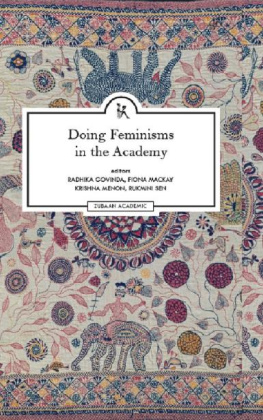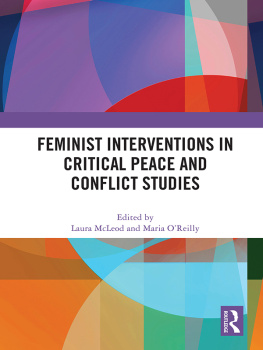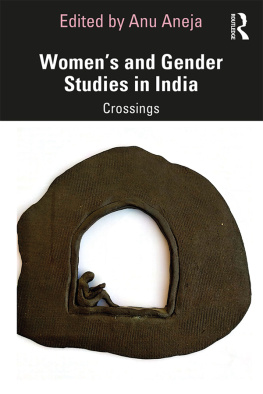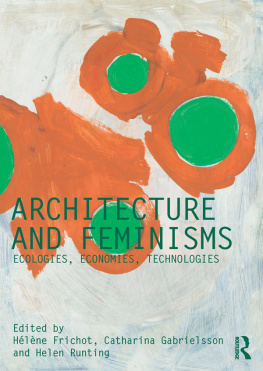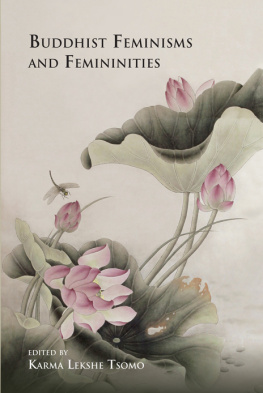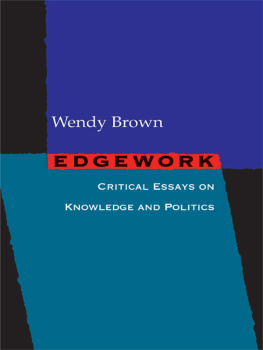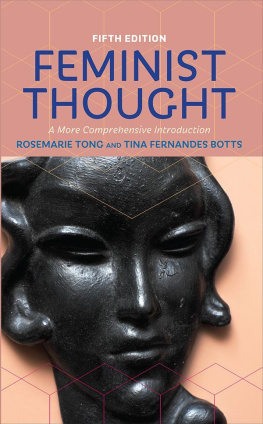Doing Feminisms in the Academy
Doing Feminisms in the
Academy
Identity, Institutional Pedagogy and Critical
Classrooms in India and the UK
Edited by
Radhika Govinda
Fiona Mackay
Krishna Menon
Rukmini Sen
ZUBAAN
128 B, Shahpur Jat, 1st Floor
New Delhi 110 049
Email: contact@zubaanbooks.com
Website: www.zubaanbooks.com
First published by Zubaan Publishers Pvt. Ltd 2020
Copyright this collection Zubaan 2020
Copyright individual essays with the authors 2020
All rights reserved
10 9 8 7 6 5 4 3 2 1
eBook ISBN: 9788194760566
Print source ISBN: 978 93 85932 96 0
Zubaan is an independent feminist publishing house based in New Delhi with a strong academic and general list. It was set up as an imprint of Indias first feminist publishing house, Kali for Women, and carries forward Kalis tradition of publishing world-quality books to high editorial and production standards. Zubaan means tongue, voice, language, speech in Hindustani. Zubaan publishes in the areas of the humanities, social sciences, as well as in fiction, general non-fiction, and books for children and young adults under its Young Zubaan imprint.
Table of Contents
Introduction: Being Feminist, Doing Feminisms in the
Academy in India and the UK
Radhika Govinda, Fiona Mackay, Krishna Menon and Rukmini Sen
SECTION I
HISTORIES OF DOING FEMINISM IN THE ACADEMY
Radhika Govinda
Rukmini Sen and Krishna Menon
SECTION II
NEGOTIATING THE ACADEMY/ INSTITUTIONAL PEDAGOGIES
Fiona Mackay and Krishna Menon
Kamya Choudhary
Kanchana Ruwanpura
Meryl Kenny
Rachana Johri
SECTION III
ENGENDERING DISCIPLINES, DISCIPLINING GENDER
Rukmini Sen
Megan Harrington
Pablo Schyfter
Sarah Golightley
Lauren Wilks
SECTION IV
PEDAGOGIES OF IDENTITY AND DIFFERENCE
and Social Location in the University Classroom
Sumangala Damodaran
Abdul Rahman K.C.
Bindu K.C.
Radhika Govinda
SECTION V
FEMINIST RESEARCH AND REFLEXIVITY
Lisa Kalayji
rla Meadhbh Murray
Nibedita Hazarika
Syeda Naghma Abidi
Nancy Yadav and Shailly
Acknowledgements
Doing Feminisms in the Academy is one of the fruits from a North-South research and pedagogic collaboration of feminist academics from Scotland and India. Led by Radhika Govinda (University of Edinburgh, UK) and Krishna Menon (Ambedkar University Delhi, India), the collaborative project Teaching Feminisms, Transforming Lives has brought together academics and doctoral scholars from a wide breadth of disciplines and fields of enquiry at both universities, including development studies, economics, education, English literature, human geography, political science, psychosocial studies, science and technology studies, social work, sociology, South Asian studies and womens and gender studies. The twin aims of the collaboration were: to highlight the struggles and successes of feminists in the academy, particularly with respect to addressing gender inequality, identity politics and gender-based violence; and to co-create feminist pedagogical tools to strengthen the pursuit of gender equality and social justice in higher education institutions (HEIs) and beyond to contribute to decentring knowledge production.
The connections and contrasts between the University of Edinburgh and Ambedkar University Delhi have made for a North-South collaboration with productive tensions and rich opportunities for mutual learning. The University of Edinburgh is an old elite university of the global North with its roots in the European Enlightenment and Britains colonial past. It is a comprehensive university with an international reputation for research and teaching excellence. The recently established Ambedkar University Delhi has an exclusive focus on research and teaching in the social sciences and humanities, and a strongsocial justice and inclusion mission. It is fast acquiring a name for itself in Indian and international circles. At the University of Edinburgh stand-alone courses on gender and feminism have been offered since the 1970s but for several years now there have been no dedicated degree programmes in women, gender and sexuality studies. In contrast, at Ambedkar University Delhi three postgraduate degree programmes dedicated to womens and gender studies were set up in the first five years of the universitys existence, and these continue to be offered in 2019. The differential manner in which teaching (and research) on women, gender and sexuality has taken shape at the University of Edinburgh and at Ambedkar University Delhi is representative of the two modes through which academic feminism has come to be institutionalised in universities across the world, and this offers a rich and exciting canvas of experiences to reflect upon, as attempted by the contributors to this volume.
In expressing our thanks, we begin by acknowledging the UK-India Educational Research Initiative (UKIERI) and the University Grants Commission (UGC), India, for funding our collaborative project Teaching Feminisms, Transforming Lives upon which the volume is based. Special thanks to Jaspreet Grewal and Suruchi Pareek from UKIERI for their keen interest in our project. Our funders generous support enabled the Teaching Feminisms, Transforming Lives project to hold workshops and public events in Delhi (December 2017) and Edinburgh (February 2018 and May 2019) during exchange visits undertaken by the team of academics and students associated with it.
We thank all the participants of the workshop panels, roundtables, working sessions and public lectures. These include academics and students from 19 HEIs as well as NGO activists in India and the UK, whose voices and perspectives have inspired the contributors of this volume to articulate their experiences of doing feminisms in the academy in India and the UK. We particularly thank Meenakshi Gopinath, Mary John and Bijayalaxmi Nanda in India and Maria Do Mar Pereira, Anni Donaldson and Lesley Mcmillan in the UK for their engagement with the project.
We wish to record our deep appreciation for the edited volume contributors, each of whom has brought a unique insight. The exchange visits they undertook during the project deserve a special mention, given how these informed their insights. For most of the University of Edinburgh-based contributors, this was a first visit to India and to Indian HEIs. For most of the Ambedkar University Delhi-based contributors too it was their first time in the UK and at British HEIs. These visits were occasions for the volume contributors as three generations of feminist academics and all proud inheritors of the legacy of the founding foremothers of womens and gender studies in both the UK and India - to renew their passion and commitment to the field, now increasingly recognised as a discipline, and its animating politics -feminism. Equally, these visits offered a space to collectively and comparatively reflect on the dilemmas, frustrations and aha! moments encountered within and outside university classrooms; and to express solidarity and extend support to each other in the struggles that academics face in doing feminisms in their respective institutional environments and the difficulties they encounter in decolonising feminist knowledge. These critical and compassionate reflections - otherwise relegated to the informal spaces of academia, such as hallways outside offices and meeting rooms, the side-lines of conferences and seminars, and in tweets and Facebook posts - have culminated in this collection of autoethnographic chapters, as well as in collegial relationships and academic friendships that will sustain our ongoing dialogue.

